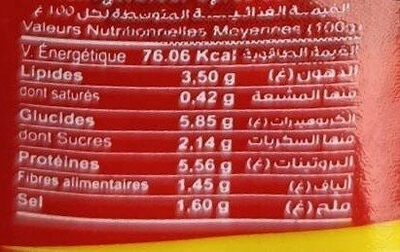Moutarde de Dijon Forte -
This product page is not complete. You can help to complete it by editing it and adding more data from the photos we have, or by taking more photos using the app for Android or iPhone/iPad. Thank you!
×
Barcode: 61302495
Categories: Condiments, Sauces, Mustards, Groceries
Matching with your preferences
Environment
Carbon footprint
Packaging
Transportation
Report a problem
Data sources
Product added on by kiliweb
Last edit of product page on by kiliweb.
Product page also edited by amea01, desan, openfoodfacts-contributors, scanbot, yuka.WWFrdExxa0NxTmM2dVAxdjNqN1EzWWxveU1HallHZVZMTG96SVE9PQ, yuka.sY2b0xO6T85zoF3NwEKvlkVuVYvsnjfEED3kt2Ou74-_Frv4Rc0u24PdGao.
If the data is incomplete or incorrect, you can complete or correct it by editing this page.











